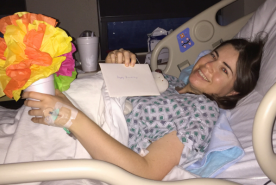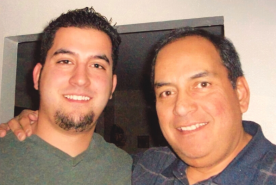If your child has been diagnosed with chronic kidney disease, you are no doubt feeling distressed and bewildered. These feelings are normal. And once you realize that your child's illness is a reality the family must accept, you can develop some practical ways to cope with the day-to-day aspects of it. Here are some things others have found helpful.
Learn about the disease and its treatments
- Learn as much about your child's disease and its treatment as you possibly can. And pass this information on to your child. You'd be surprised at how much even very young children can understand. And many times they will accept information more easily than an adult.
- Encourage your child to ask questions not only of you but of doctors, nurses and other health professionals. Many times, your child will ask questions you had not thought about or were afraid to ask because you thought they sounded "dumb."
- Don't try to explain more than your child can understand, but don't lie and don't apologize for any treatments or procedures that have to be followed.
- Help your child understand that the doctors, nurses, social workers, dietitians, laboratory personnel and everyone else is on his or her side. They all want to help your child feel better, even if that means they have to do things that will cause some temporary pain or discomfort.
Actively participate in your child's care
- Develop a spirit of mutual respect and cooperation with health professionals.
- Write out all the details of your child's medical history, including dates. This will make it easier for you each time you come in contact with a new doctor.
- Try to be with your child as much as possible during treatments and any hospitalization that might be necessary. If you cannot be there, arrange for someone else to be present ¾ a grandparent, other relative, or close family friend. And make sure a favorite book, stuffed animal or special blanket is taken along.
- If your child is not talking yet, it's a good idea to tape a note to his or her hospital bed or crib with helpful information for the staff, such as favorite foods, special toys or blankets, preferred time and method of taking medicines.
Help your child take control of the illness
- Try to maintain a normal daily routine, even during hospitalization.
- Help your child understand about doctor's offices, hospitals, dialysis units and laboratories and how they are used. By helping your child understand the places that are filled with strange and frightening instruments and machines, you can help eliminate a lot of your child's fear.
- Be creative in finding ways for your child to participate in his or her own care. Your child will feel much more in control if you provide as many opportunities to do so as you can.
Help your child to understand and accept diet restrictions
- Even a child as young as 2 or 3 can understand about "diet" if it is explained simply. Often, the child will be more compliant with dietary restrictions than an adult will.
- Have your child make a list of favorite foods and take him or her with you when you talk to the dietitian to see if these foods can be incorporated into the diet plan.
- Whatever you do, don't ever use bribes or force your child to eat. These tactics rarely work and more often turn mealtime into a very unpleasant experience.
Don't let medicine time ruin your day
- A matter-of-fact attitude is your best weapon in getting your child to take medication. Even very small children will swallow anything no matter how distasteful if they know they have no choice.
- A good trick with babies and small children is to use syringes minus the needles to dispense the medication. Not only can you measure the medicine more accurately, but you can squirt the liquid directly in the child's mouth instead of having to deal with a teaspoon (associated with food) or a medicine cup. The benefit to your child is in not having to smell the medicine as well as taste it.
- Your child has no choice about whether or not to take prescribed medication, but you can offer a choice of when and where.
- And once the choice is made, make a schedule and stick to it. Unpleasantness is a lot easier to cope with if you know exactly when it is coming and don't procrastinate.
- Sometimes medication must be given with meals, but don't give it at the table where your child eats. Find someplace not associated with food and eating, such as the living or family room while your child is distracted by a favorite TV show.
- Another weapon you have at medicine time is plain, ordinary water. If your child is on a fluid-restricted diet, water may be one of the things he or she would like to have most, so reserve part of the day's fluid intake for a couple of swallows after medicine time.
Share your experience with others
- Don't let yourself become isolated. Talk with the renal staff and with other families of children with kidney disease.
- Don't hesitate to ask relatives and friends for help. Chances are they want to, but don't know how, and are just waiting for you to ask. Sharing your experience will help you find ways to grow with it.
If you would like more information, please contact us.
© 2015 National Kidney Foundation. All rights reserved. This material does not constitute medical advice. It is intended for informational purposes only. Please consult a physician for specific treatment recommendations.








